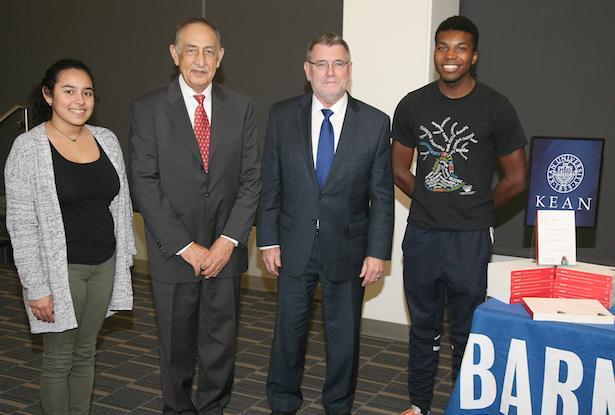Holocaust Scholar Peter Hayes Speaks at Kean University

Kean President Dawood Farahi, Ph.D., and Holocaust scholar Peter Hayes, Ph.D., with Human Rights Institute at Kean University students Natalie Hernandez and André Matthews.
Holocaust scholar and author of Why? Explaining the Holocaust, Peter Hayes, Ph.D., took on two key questions about the Holocaust in a lecture at Kean University on Monday, December 4. Hayes gave the Murray Pantirer Memorial Holocaust Scholar Lecture, which is funded by the Holocaust Resource Foundation, a private philanthropic organization, and organized by the Holocaust Resource Center of Kean University. He focused his talk around the questions, why were Jews murdered and why couldn’t anyone stop it?
“The Holocaust Resource Center is one of the oldest in the country, and Murray was a strong, staunch supporter,” said Farahi. “The Holocaust is the most horrid act of inhumanity in history and should never be forgotten. Our work with the Center and this lecture tonight continue Murray’s work.”
-Dawood Farahi, Ph.D.
President of Kean University
Hayes, who is also the chair of the academic committee of the United States Holocaust Memorial Museum, spoke about a mass acquiescence that enveloped Germany as Hitler took power.
“Most Germans did not agree with Hitler, but they did not disagree with him either,” said Hayes. “There was a shortage of anti- anti-Semites. This is how the Nazis created a society willing to conduct mass murder.”
Hayes took the rapt audience in Kean’s STEM Building auditorium through the history of anti-Semitism, explaining how the Nazi’s expansion plans into countries with large Jewish populations, along with the Nazi ideology to create a society free of Jews, led to the Final Solution.
“At the same time, everyone who could have intervened had another priority,” he said, adding that the Jews themselves “did not see this coming. No one did. The Nazis themselves didn’t see it coming until 1941.”
The Murray Pantirer Memorial Holocaust Scholar Lecture is named after the first president and a founding member of the Holocaust Resource Center of Kean University. Pantirer was his family’s sole survivor of World War II. He was sent to work at Oskar Schindler’s munitions factory in Czechoslovakia and was one of the 1,200 Jews rescued by the German industrialist who, with his wife, was recognized as Righteous Among the Nations in 1993.
“My grandfather spent his life telling the world of the Nazi atrocities,” said Danielle Schwartz Auerbach, Pantirer’s granddaughter. “He taught his children and grandchildren the obligation of each and every one of us to ensure that children from elementary school through college are taught the lessons of the Holocaust and to understand the dangers and consequences of hatred, prejudice, racism, indifference and silence. He always felt that one of the best ways to achieve these goals was through the Holocaust Resource Center of Kean University.”
Kean President Dawood Farahi, Ph.D., welcomed the audience to the University, and recalled Pantirer’s tireless fight to build a better society through understanding and knowledge.
“The Holocaust Resource Center is one of the oldest in the country, and Murray was a strong, staunch supporter,” said Farahi. “The Holocaust is the most horrid act of inhumanity in history and should never be forgotten. Our work with the Center and this lecture tonight continue Murray’s work.”
The Holocaust Resource Center of Kean University is a joint initiative between the University and the Holocaust Resource Foundation. The Center collects and disseminates Holocaust history to foster and reinforce awareness of the Holocaust, and offers Teaching the Holocaust and Teaching Prejudice Reduction courses. The Center has a collection of 220 original Holocaust survivor and liberator oral history testimonies, which are archived on Kean’s Union campus.